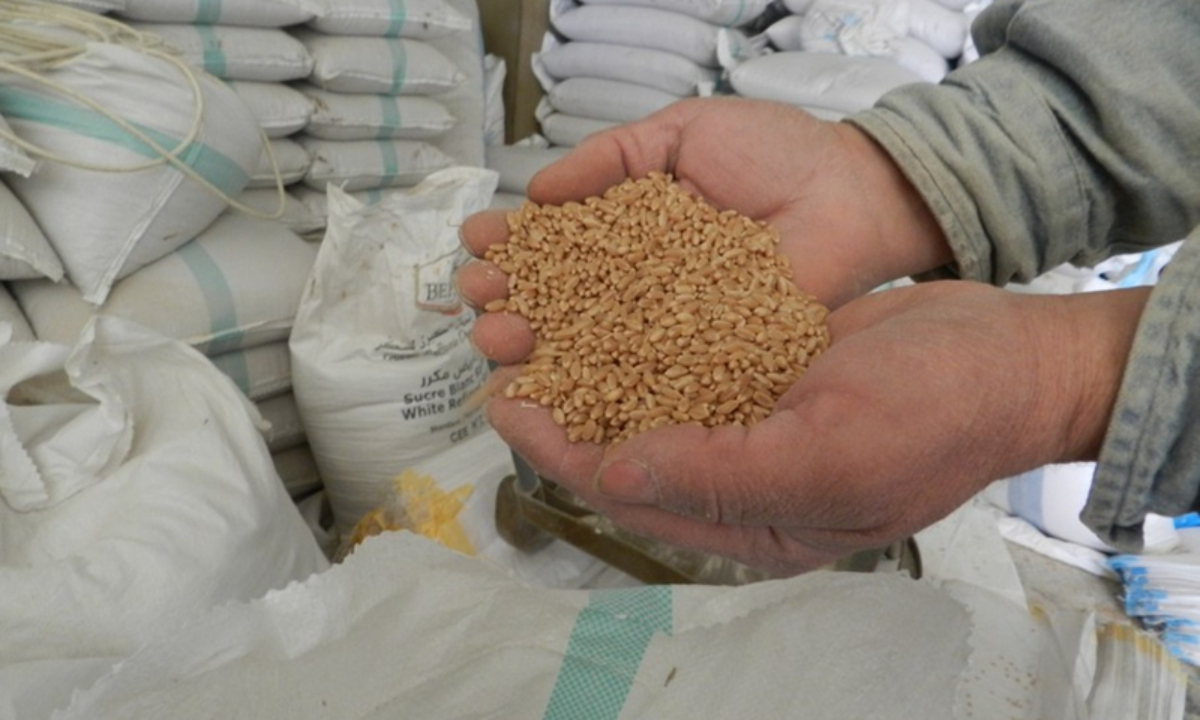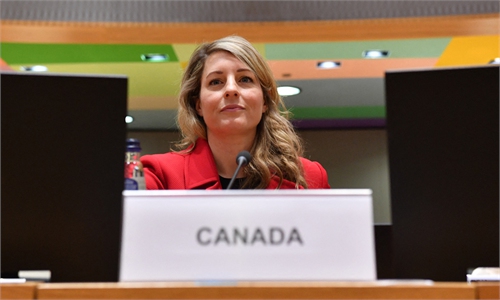
Photo: Xinhua
New global crises are emerging from the ongoing Ukraine conflict, with the potential to cause millions of people to go hungry and spark social unrest throughout the most vulnerable developing countries.
Russia and Ukraine produce 30 percent of the global wheat supply and 69 percent of the world's sunflower oil. Ukraine, the breadbasket of the world, cannot export much of its produce during the conflict, while many countries also cannot do business with Russia due to the West's financial sanctions.
The US has accused Russia of holding global food supplies hostage as crisis looms, but the US, the instigator of the crisis, has many ways to put it to an end but is not prepared to use any of them.
After all, it is the developing countries that are being held hostage by the US-provoked war. The US is playing an old hand in doing this. The US sees financial opportunity on the pyramid built up of dying people from these countries.
A prolonged Ukraine crisis best suits the US' global strategic ambitions, and it will achieve them even if it comes at the cost of the interests of developing countries.
Cost-counting
In Sri Lanka, rising inflation has led to a wholesale economic emergency, with extreme shortages of food, medicine and fuel. On May 9, violence erupted after supporters of former prime minister Mahinda Rajapaksa attacked anti-government protesters demanding his ouster over the country's worst economic crisis that led to acute shortages of staple food, fuel and power.
War-torn Iraq has seen protesters take to the streets as food prices spiral upwards. Analysts also warn of a sovereign risk factor in Egypt, the Arab world's most populous country which alone imports 80 percent of its wheat from Ukraine and Russia.
In Africa, a widespread surge in inflation poses risks particularly to South Africa, Zimbabwe and Sierra Leone. Economic difficulties could also exacerbate social tensions in crisis-hit parts of the continent, such as the Sahel, parts of central Africa and Horn of Africa.
In other words, if the Ukraine crisis does not end, these developing countries will have to continue to bear these costs. Nonetheless, rather than putting an end to the crisis, the US has resorted to various means to fan the flames of it instead.
On the one hand, it ratchets up opinion offensives against Russia and tries to leave the world the impression that Russia is to blame for all the sufferings throughout the rest of the world.
On the other hand, American weapons are pouring into Ukraine. The most conservative analysis of US security assistance directly for Ukraine since the conflict started on February 24 has come to about $9.8 billion, with Congress just having passed a new appropriation. In late April, US Congress passed lend-lease legislation that will make it easier to export military equipment to Ukraine.
Obviously, the US does not offer this for free. Ukraine has to pay back one way or another. It only adds financial burdens to Kiev and feeds the US military-industrial complex.
Held hostage by US-provoked war
In most cases, it is developing countries that lack the capacity to respond to a crisis and the social disturbances along with it. The lack of domestic financial resources and high debt levels as well as their lack of discourse power in international rules expose them to more risks, Song Luzheng, a research fellow at the China Institute, Fudan University, told the Global Times, noting that the financial crisis more than a decade ago that started in the US was what eventually fueled the "Arab Spring."
The US also faces new challenges against the backdrop of the Ukraine conflict. The conflict will fuel the already high inflation and slow growth in consumer spending. But as the world's sole superpower, the US has the capacity and means to cope with it. Federal Reserve Chair Jerome Powell once said, the "strong financial shape" of households and businesses may help sustain spending.
Even in the wake of the baby formula shortage, supplies are being airlifted from Europe and President Biden has the power to invoke decades-old wartime powers to speed production.
To cope with its own crisis, the US created a lot of liquidity to enter the speculative market through large-scale additional currency issuance, which led to a sharp rise in the world market prices of raw materials, energy, and food.
"In essence, the whole farce is caused by the unilateral moves by the US and the West which want to suppress Russia by taking advantage of the Ukraine crisis at whatever cost," Zhang Tengjun, deputy director of the Department for Asia-Pacific Studies at the China Institute of International Studies, told the Global Times.
A few days ago, Canadian Foreign Affairs Minister Melanie Joly said the West must act quickly to help Ukraine export its growing grain stocks. Meanwhile, Canadian Prime Minister Justin Trudeau announced new arms and equipment for Ukraine after he visited Kiev on May 8. The "Weapons in, wheat out" proves that the West only accepts victory and profits, not even a bit of failure or loss.
Song warned that what the US and the West are doing is short-sighted and shoots themselves in the foot.
"The various crises in developing countries may breed the soil of terrorism and lead to an influx of refugees, which will have an adverse impact on the US and the West. Don't forget that the refugee crisis in Europe caused by the chaos in the Middle East has led to the rise of right-wing and populism in Europe, and it is Europe that suffers," said Song.
The author is a reporter with the Global Times. wangwenwen@globaltimes.com.cn


